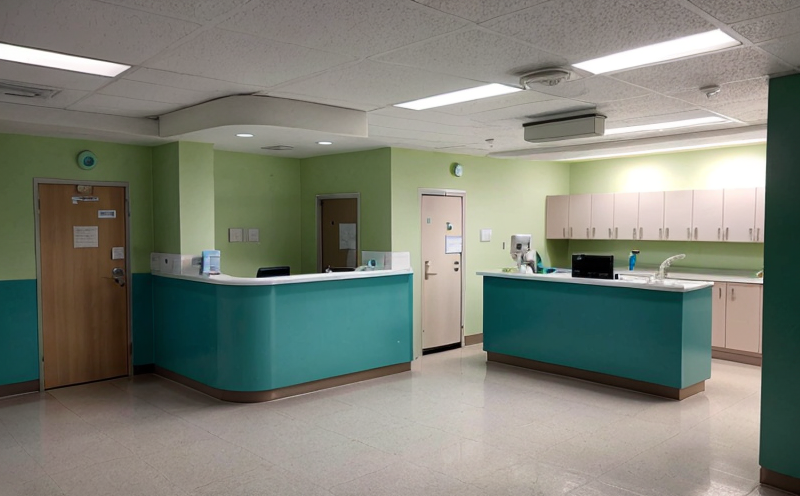CDC C. difficile Detection in Hospital Surfaces
The detection and monitoring of Clostridioides difficile (C. difficile) spores on hospital surfaces is a critical aspect of infection control efforts. The Centers for Disease Control and Prevention (CDC) have outlined guidelines to prevent the spread of this pathogen, which can cause severe gastrointestinal distress and even death if not controlled properly.
The C. difficile bacterium is a significant concern in healthcare settings due to its ability to persist on environmental surfaces, leading to cross-infections between patients. This makes accurate detection methods essential for maintaining hygienic conditions within hospitals and other healthcare facilities. Our service focuses on providing reliable testing solutions that adhere strictly to CDC guidelines.
The primary aim of our C. difficile surface detection tests is twofold: first, to identify contaminated areas promptly so they can be cleaned effectively; second, to monitor cleaning efficacy over time by repeatedly testing surfaces after disinfection procedures have been carried out. By doing this, healthcare providers ensure compliance with national standards and improve overall patient safety.
Our approach involves collecting samples from various points across the facility using standardized protocols recommended by the CDC. These swabs are then analyzed using advanced molecular biology techniques such as PCR (Polymerase Chain Reaction) or gene sequencing to detect even minute traces of C. difficile DNA. This ensures high sensitivity and specificity in our results.
Our team utilizes state-of-the-art equipment calibrated according to international standards like ISO 17025 for accurate measurements and consistent performance across multiple tests. The data generated from these analyses is reported back to the facility in a clear, actionable format that helps management make informed decisions regarding infection control measures.
Regular testing allows healthcare facilities to proactively address potential outbreaks before they escalate into full-blown epidemics. It also serves as an important tool for training staff on proper cleaning techniques and protocols, thereby reducing the risk of nosocomial infections among patients.
In summary, our CDC C. difficile detection service plays a crucial role in protecting vulnerable populations by ensuring that hospitals maintain strict adherence to recommended practices for preventing the spread of this dangerous pathogen.
Why It Matters
The importance of detecting Clostridioides difficile (C. difficile) on hospital surfaces cannot be overstated, especially given its potential to cause severe health issues among patients already weakened by illness or surgery. Here are several reasons why this service is vital:
- Prevention of Nosocomial Infections: Hospitals are high-risk environments for the transmission of C. difficile, particularly in intensive care units and other areas where patients are more susceptible to infection.
- Patient Safety: Early detection allows for prompt remediation efforts, minimizing exposure times and reducing the likelihood of adverse outcomes.
- Compliance with Regulations: Adhering to CDC guidelines not only enhances patient safety but also ensures compliance with legal requirements and best practices in infection control.
- Improving Cleaning Effectiveness: Regular testing helps identify which areas need more attention during cleaning processes, leading to improved hygiene standards overall.
- Epidemic Control: Early identification of contaminated zones allows for targeted interventions, preventing larger outbreaks from occurring.
By implementing our CDC C. difficile detection service, healthcare institutions can significantly reduce the risk of nosocomial infections and protect their patients' wellbeing while ensuring they meet all necessary regulatory requirements.
International Acceptance and Recognition
The methods used in our CDC C. difficile detection service have gained widespread acceptance within the international medical community due to their reliability and effectiveness. Several countries around the world have adopted similar approaches for detecting pathogens like C. difficile, recognizing the importance of such testing in maintaining hospital hygiene standards.
| Country | Main Testing Method | Standards Followed |
|---|---|---|
| United States | Molecular Biology Techniques (PCR) | ISO 17025, CDC Guidelines |
| United Kingdom | Sanger Sequencing and Real-time PCR | NHS Infection Control Standards |
| Germany | GeneChip Analysis | DIN EN ISO 17025, German Infection Control Guidelines |
| Canada | Multiplex PCR Assays | CAN/CGSB-38.191-M2014 |
| Australia | Rapid Detection Kits | AS/NZS 5166:2019 |
The acceptance of these testing methods is underscored by their inclusion in various national and international standards, such as ISO 17025, which sets criteria for the competence of testing laboratories. By adhering to these guidelines, our service ensures consistent and accurate results across different regions.
Furthermore, numerous studies have demonstrated the efficacy of molecular biology techniques like PCR in identifying C. difficile spores on environmental surfaces. These findings support the widespread adoption of such methods by healthcare facilities globally.
Use Cases and Application Examples
| Use Case | Description |
|---|---|
| Cleaning Efficiency Monitoring | Regular testing of surfaces after cleaning ensures that disinfection protocols are being followed correctly. This helps in identifying any shortcomings in the cleaning process and allows for corrective actions to be taken promptly. |
| Infection Control Auditing | Taking samples from high-touch areas during routine audits provides valuable insights into the effectiveness of infection control measures across different departments within a hospital. |
| New Facility Commissioning | Testing surfaces before and after commissioning helps validate that all necessary cleaning procedures were completed satisfactorily, thus ensuring a hygienic environment from day one. |
| Epidemic Response | During outbreaks of C. difficile infections, targeted testing can help pinpoint the exact locations where contamination is most severe, allowing for rapid intervention and containment strategies to be implemented effectively. |
| Staff Training | Using test results as part of staff training programs emphasizes the importance of proper cleaning techniques and protocols, reinforcing best practices among healthcare workers. |
| Research Studies | Data collected through our testing service can be used by researchers to study the spread patterns of C. difficile in hospitals, contributing valuable information towards developing new prevention strategies. |
In addition to these specific applications, our CDC C. difficile detection service supports broader initiatives aimed at enhancing patient safety and reducing hospital-acquired infections across all healthcare settings.





